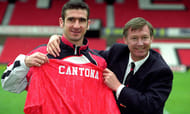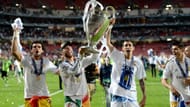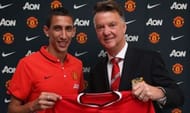The Resurrection of the Red Devils: Act II*
It was a typically cold, rainy November day in the north of England when the cocky young manager of Manchester United Football Club revealed the successful transfer of a budding superstar from a champion team. The press at the time derided the manager for what they claimed was a “panic buy”, a punt for a player that didn’t really fit the gaps that need plugging in a creaking United outfit.
The year was 1992 and the season before, United had raised a credible challenge for the League title for the first time in many a year. However, Leeds United had been crowned champions of England, even though it had been the Mancunians who had led the league for the majority of the season.
The trauma of losing to their hated Yorkshire neighbours had left an irreparable dent in the team’s psyche, as the players, seemingly suffering from some form of Post-Traumatic Stress Disorder, struggled to transform into a coherent winning unit. The team lay languishing in 10th place by the close of November.
It appeared that this would be curtains for their title hopes and for the United career of their dynamic manager – their torturous wait for an eighth League title looking like it would carry on for a long, long time. All that changed, however, on that momentous November day when Sir Alex Ferguson unveiled the newest addition to his squad – a certain Frenchman named Eric Daniel Pierre Cantona.
Strutting around Old Trafford like a proud peacock well aware of his own magnificence, the man they called King Eric owned football games with a magic never seen before on English shores, as he revitalized his demoralized teammates with his consummate skill and overwhelming charisma.
That risky punt, that glorious ‘panic buy’, would prove to be the magic potion that would resurrect a struggling Manchester United and get them to their first title in 26 years. The rest, as they say, is history. United would go on to win three more in the next four years that Cantona graced the hallowed turf of Old Trafford (one must take into account here the overwhelming impact that the 8 month ban that Cantona suffered – for kung-fu kicking the face off a xenophobic Crystal Palace fan – had on United’s title challenge in 1994-95, the one year Cantona did not win the league with the Red Devils).
Today, a year and a bit into the post Ferguson-era, United are being dismissed as irrelevant and appear to be on the brink of another torturous slide into mediocrity – the dangers of this are very real – as the players struggle to come out of the ‘Ferguson withdrawal syndrome’ and overcome the PTSD they seem to be suffering after the unmitigated disaster of poor David Moyes’ reign.
Eerily, as yet another cold and rainy day comes to an end in the North of England, the press are deriding another cocky manager of Manchester United Football Club for the signing of a budding superstar from a champion team. A signing they claim is a “panic buy”, a punt for a player that doesn’t really fit the gaps that need plugging in a creaking United outfit.
With the hope that it will shut up the ever growing circle of arm-chair critics and expert detractors surrounding him, Louis van Gaal will be praying that the arrival of Ángel Fabián Di María Hernández does for his demoralized troops what the arrival of King Eric did for Fergie’s beaten down boys so long ago.
The Fallen Ángel
The tale of how the skinny little boy from Rosario rose to become arguably the most important player in the Real Madrid side that won the elusive “La Decima” – that historic 10th European triumph – and then suddenly found himself excluded from Los Merengues’ plans for the future, perfectly encapsulates the best and the worst of modern football.
Di Maria’s scintillating displays on the left wing for his beloved hometown club Rosario Central had enamoured him to the crowds and had convinced European scouts enough to take him to A Catedral – the Estadio da Luz – home to the illustrious Sport Lisboa e Benfica football club. His three years in Portugal showcased his best qualities – his lightning pace, willingness to run directly at opponents and an uncanny ability to pick out teammates at key moments. He didn’t score all that much in Lisbon, but when he did, it made for quite a spectacle.
His unquestioned abilities were rewarded with the ultimate recognition when Real Madrid and the Galacticos came a-calling. Now represented by the superstar that is Jorge Mendes, Di Maria commanded a deal reportedly in excess of €35 million. Initially moved out to the right wing to accommodate the sporting colossus that is Cristiano Ronaldo on the left, Di Maria adapted to the role and grew in confidence as he started to become one of the most pivotal players in a star-studded squad.
The never ending hunt for more Galacticos saw Gareth Bale move to Madrid for a mind-boggling, record smashing transfer fee, and with his arrival, Di Maria found himself adapting once again to a new role, this time deeper in midfield.
Playing alongside the understated class of Xabi Alonso and the buzzing genius of Luka Modric, the Argentine quickly established himself in his new role, becoming arguably the most influental player in the squad. His tireless running made him the connect between defense and attack, and his genuine quality on the ball set up chance after chance for the galacticos up front.
It was his mazy, unbelievably fast run and shot that got parried on to Bale’s path, for the Welshman to head home Madrid’s crucial second goal in last season’s Champions League final.
Di Maria had also by then quickly established himself in the Argentine national squad, scoring the winning goal as Argentina won gold at the Beijing Olympics and shining brightly at 2010 World Cup. He was perhaps La Albiceleste’s most influental player in this summer’s World Cup – his pace and skill were sorely missed in that epic final loss against Germany.
This summer though, with the arrival of Toni Kroos and James Rodriguez as Madrid intensified their mad-hat Galactico policy, Di Maria had had enough.
No one on the team or coaching staff wanted to see him leave. And neither did the fans, for whom the flying winger was a cult hero. But Florentino Perez recogonized that Kroos and more so, the Colombian hero, Rodriguez, were more marketable entities than the Argentine. And when Manchester United came along (with due help from Señor Mendes), waving a cheque for 75 million Euros, the tidy profit it represented was too good to turn down.
Di Maria had fallen from grace, and it had nothing to do with his sporting ability – forget footballing considerations, this was purely and simply a business transaction. The Fallen Ángel will have a point to prove in Manchester.
The Resurrection of the Red Devils: Act III?
Just like in 1992, an under-fire Manchester United manager has taken a punt by buying an icon idolized by the fans yet unwanted by the management of ‘The Whites’ (the Spanish version in the latest case). Where Cantona had suffered differences with his manager (whose demands of adherence to a rigid structure and cutting down of any crowd-pleasing tendencies were alien to the fiery Frenchman), Di Maria was cast aside by the top management at Madrid for the heinous crime of not being marketable enough.
As characters go, though, they could not be more dissimilar – Di Maria’s quiet on-field demeanour has more in common with club legend Ryan Giggs than with Cantona’s preposterous arrogance and natural, awe-inspiring, charisma.
If the French master could seize a match by the scruff of its neck with his magical ability to read a game like he wrote it and an exceptional eye for vital goals, the lanky Argentine is moulded in the tradition of the great wingers of United – players like Giggs, George Best and a young Cristiano Ronaldo. These are players who made things happen on a football field simply by doing what they did best – running at defenders with extreme pace, the ball at their feet acting as a mere extension of their own bodies.
They do however, share the one thing that sets potentially great players apart from the mere good ones – an unquenchable will to win, a philosophy that they would rather lie down dead on the pitch than give up, and the ability to turn it on when it matters and win a game single-handedly for their team.
While enough and more has been written on the travails of the United of today – their trouble in central midfield and in defence having been chronicled with the intensity of a Nobel prize winning scientific experiment – the fact remains that United still have the players to be a potent offensive force.
Players like Wayne Rooney (who has looked increasing lethargic ever since Ronaldo left), Robin van Persie (who has still not recovered from the shock of Fergie’s retirement) and Juan Mata (who is a much better player than he has shown – as Blues fans will testify) – are extremely good at what they do and should not be performing as indifferently as they are currently.
In ’92, Cantona’s out-of-the-box genius on the pitch and constant need to improve off it inspired his highly skilled teammates (Bryan Robson, Paul Ince, Andrei Kanchelskis, a young Ryan Giggs and Lee Sharpe amongst others) as he provided the offensive spark that helped achieve United achieve unprecedented heights.
With his scorching pace, incredible vision and an eye for the killer pass, Ángel Di Maria may well be the catalyst to set things right for the out-of-sorts lot that wear the Red of Manchester United.
It might just turn out that the Fallen Ángel will resurrect the Red Devils. Watch out England.
*Author’s note: I started this article with Act II because Resurrection: Act I will always be the immortal Sir Matt Busby’s astonishing reconstruction of the club after the tragedy of Munich 1958.



